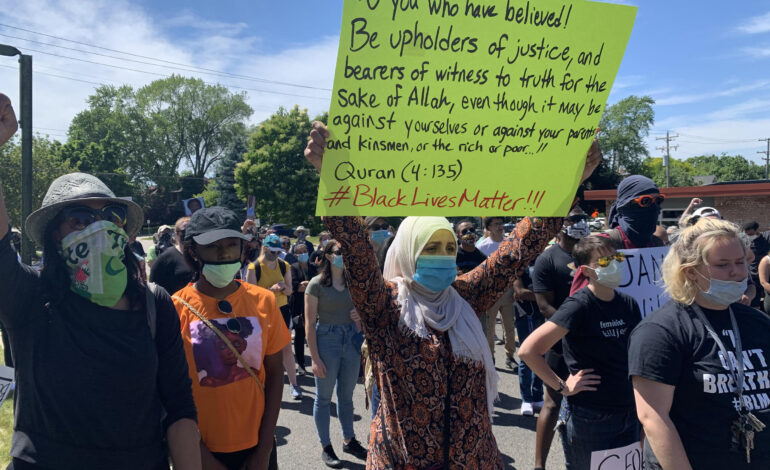It is time to get uncomfortable. It is time for us to move outside our comfort zones from what has always felt “cultural” and “traditional” and into a place of growth and understanding. It is time for us to un-learn colonial and racist language and ideologies within the community and re-learn from a place of education, history and empathy at the very basic human level.
How often are we challenging racist conversation simply to avoid making things uncomfortable at a family gathering? How often are we profiling Black people who come into local shops and gas stations for no other reason than the color of their skin? How often are we teaching our children to refer to those who are Black as “abeed” and hiding behind the guise of religion, claiming that we are all “abeed Allah?” (which in fact is not true at all). Anti-Blackness in the Arab community is reinforced by Western colonialism and racism. Oppression comes in many forms and affects communities of color all over the world.
While our struggles may not be identical, they are interconnected in many ways and the system that oppresses us has been successful because it has divided our communities in a way that makes us feel otherwise. As activist and author Angela Davis once said, when we try to conceptualize social justice struggles, we will always defeat our own purpose if we fail to view those around us who are struggling as equal partners. While it is not appropriate to compare struggles amongst the Arab and Black communities, it is imperative that we connect them. There are so many different systems and structures that work to oppress us and the only real way we have a fighting chance is if we connect the dots between these systems and our communities and unite as a collective.
![Shayma Ghalab [left] and Thuraya Yahra were among several young Arab American protesters who joined Sunday's demonstrations on June 7 in Dearborn and Detroit. "We know all about being oppressed," Ghalab said. – File photos courtesy of Michigan Radio](https://arabamericannews.com/wp-content/uploads/2020/07/dearborn_2_1.jpg)
Shayma Ghalab [left] and Thuraya Yahra were among several young Arab American protesters who joined the demonstrations on June 7 in Dearborn and Detroit. “We know all about being oppressed,” Ghalab said.
– File photo courtesy of Michigan Radio
While fighting for their own rights, Black activists have paved the way towards opportunities that are not just for themselves but for us as well. Through this, Black people have been beaten, jailed and even killed for fighting for the rights that we as immigrants and Arabs are able to enjoy in this country today. We owe them this much in return, as we are all fighting the same system that would rather see us compete against each other than stand in solidarity together.
So, where do we start? It starts at home. Let’s begin to have conversations that push our usual boundaries of comfort to educate not only our children, but the older generation around us who may still have a black and white way of thinking. Taking a pro-active approach to educating ourselves is incredibly important as well; and we are privileged enough to have a plethora of resources that can educate us on systemic and institutional racism and the affects that it has had on Black and Brown communities.
The language that we use is so important and can be complicit in continuing to perpetuate White-supremacist and colonialist ideologies. We must also take a good hard look at the spaces we occupy and are living in as well. Are we making our community a place where Black people feel safe and welcomed? Are the spaces we occupy such as local businesses, mosques, etc. inclusive of all people? If not, can we truly call ourselves allies? It is far too often that local events in the community are advertised with panels consisting of only or majority, White-passing speakers. We must be mindful of being inclusive and help to amplify Black Arab voices in our community and leadership.
Through education and inclusion, we can begin to advocate for the Black community in a more helpful and mindful way, whether it be using our social media platforms, donating, protesting, signing petitions and other productive action items. It is not enough to not be racist anymore; it is our very human duty to be anti-racist and practice this in our everyday lives. Unlearning and re-learning is not easy work. It requires us to meet numberless defenses that rise within us about our culture and who we are as individuals.
At the basic human level, we are not inherently bad, but after years and years of conditioning have been led to believe that inequality and racism is just another way of life. It is time for us to listen and to learn. It is time to rise up together and to fight these injustices as a united front. “Do the best you can until you know better. Then when you know better do better,” — Maya Angelou.
– Sara Nasser is a resident of Dearborn, Michigan and a mental health advocate. She is a M.A. candidate in clinical mental health counseling and art therapy at Wayne State University. Contact info: nassers@umich.edu






Leave a Reply